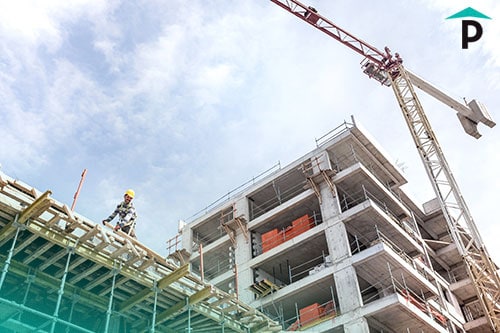A contract bond for construction is important for you to know about if you will be working to complete a project. Construction Contract Bonds work like an insurance policy in some ways. A contractor buys the construction bond to protect both himself and the project owner during the course of the project. If during the course of the project a problem happens, the owner files a claim with the insurance company.
Contract Bonds
There are three main groups or parties involved in a contract bond. The principal is the person or group that buys the bond. For most situations, the principal is either the general contractor or subcontractor. The surety company is the group providing the bond for the project. They pay if a claim is filed.
Call: (844) 612-7238 to get started
The obligee is the person who gets paid if there is a problem on the project. Who is included in this group will change depending on the project. For a payment bond, it is usually the subcontractor or supplier. For a performance bond, it is usually the property owner.
Payment Bonds
 A subcontractor payment bond ensures the property owner is protected against non-payment. It also will protect suppliers and subcontractors on the project to make sure they get paid for the work they do. It makes sure that the principal pays the other subcontractors, laborers, and suppliers on the project. They are required for public projects.
A subcontractor payment bond ensures the property owner is protected against non-payment. It also will protect suppliers and subcontractors on the project to make sure they get paid for the work they do. It makes sure that the principal pays the other subcontractors, laborers, and suppliers on the project. They are required for public projects.
For this kind of surety bond, the subcontractors and suppliers are the obligees. If the principal doesn’t make a payment, then the suppliers or subcontractors can file a claim. The cost can vary depending on credit history and financial standing of the contractor. Pinnacle Surety goes the extra mile to help our contractors and clients get the surety bonds they desire.
Performance Bond
A performance bond makes sure that a contractor performs the work according to the contract. If the contractor defaults in the middle of a project, then the owner is protected against having to hire someone else to come in and finish the project. In addition to protecting the project owner from unfinished work, it also protects them against work that is not up to the standards set forth in the contract.
In this kind of surety bond, the project owner is the obligee, and the GC or subcontractor is the principal. The project owner may make a claim against the surety bond if there is incomplete work or subpar work.
Bid Bonds
Bid bonds are meant to protect a project owner to let them know a contractor will follow through with a bid and sign the contract for the bid amount if awarded the job. It keeps contractors from backing out of the deal after they know what other contractors bid on the project. If the contractor forgot to factor something into their bid, it also protects the owner from having the price go up after assigning the job. If they don’t complete the project with the amount listed, then the surety pays the difference.
These surety bonds are made for the project owner just like performance and payment bonds. The owner has to notify the surety company if a claim needs to be filed. They are inexpensive and are typically only a few hundred dollars. Sometimes they don’t cost anything since they often lead to purchasing another bond.
Subdivision Bonds
Subdivision bonds make sure that a contractor will improve the land in a subdivision in accordance with agreements with local jurisdiction. This may include sidewalk maintenance, grading changes, or electrical upgrades. The jurisdiction is who sets the bond amount and the date of completion of the project. The jurisdiction will file the claim if one is needed.
Completion Bonds
A completion bond helps to assure the project owner that the job will be done within budget, on-time, and free of liens. Because they cover the completion of the whole project and not just a specific contract, they are different from performance bonds. You can use both a completion and performance bond on the same project.
Permit Bonds
 A permit bond gives protection to a business that uses a permit. They are used a lot in commercial projects and give business protection when the government requires them to get a permit. An example of this would be a building permit.
A permit bond gives protection to a business that uses a permit. They are used a lot in commercial projects and give business protection when the government requires them to get a permit. An example of this would be a building permit.
Subcontractor Bonds
Sometimes subcontractors are needed on a project to complete specialized work the general contractor cannot do itself. If a general contractor uses subcontractors for their project, they may have a subcontractor bond. The general contractor is responsible for paying all subcontractors that work on the project. This is a specific agreement between the subcontractor and the surety. The surety will make sure the subcontractor is paid for all work and supplies done on the project, even if the contractor doesn’t pay when they are supposed to pay.
Other Bonds
There are many different kinds of bonds, and while all are not listed here, there are a few others that should be mentioned.
- Lateral Support Bonds – These may also be called excavation bonds or shoring bonds. They are used when there is sewer or sanitary work that is being done on a project.
- Excavation Surety Bonds – These bonds are required by a government agency if a project requires earth moving activities. It helps ensure that all laws and regulations are followed in accordance with local laws.
- Grading Permit Surety Bonds – This type of bond ensures that the property owner has enough money to cover all the costs of grading work. This helps prevent projects from being only partially completed due to a lack of funding.


